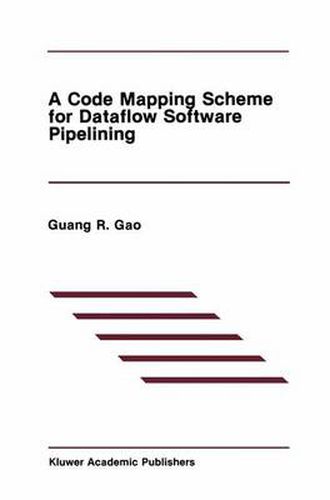Readings Newsletter
Become a Readings Member to make your shopping experience even easier.
Sign in or sign up for free!
You’re not far away from qualifying for FREE standard shipping within Australia
You’ve qualified for FREE standard shipping within Australia
The cart is loading…






This title is printed to order. This book may have been self-published. If so, we cannot guarantee the quality of the content. In the main most books will have gone through the editing process however some may not. We therefore suggest that you be aware of this before ordering this book. If in doubt check either the author or publisher’s details as we are unable to accept any returns unless they are faulty. Please contact us if you have any questions.
This monograph evolved from my Ph. D dissertation completed at the Laboratory of Computer Science, MIT, during the Summer of 1986. In my dissertation I proposed a pipelined code mapping scheme for array operations on static dataflow architectures. The main addition to this work is found in Chapter 12, reflecting new research results developed during the last three years since I joined McGill University-results based upon the principles in my dissertation. The terminology dataflow soft ware pipelining has been consistently used since publication of our 1988 paper on the argument-fetching dataflow architecture model at McGill University [43]. In the first part of this book we describe the static data flow graph model as an operational model for concurrent computation. We look at timing considerations for program graph execution on an ideal static dataflow computer, examine the notion of pipe lining, and characterize its performance. We discuss balancing techniques used to transform certain graphs into fully pipelined data flow graphs. In particular, we show how optimal balancing of an acyclic data flow graph can be formulated as a linear programming problem for which an optimal solution exists. As a major result, we show the optimal balancing problem of acyclic data flow graphs is reduceable to a class of linear programming problem, the net work flow problem, for which well-known efficient algorithms exist. This result disproves the conjecture that such problems are computationally hard.
$9.00 standard shipping within Australia
FREE standard shipping within Australia for orders over $100.00
Express & International shipping calculated at checkout
This title is printed to order. This book may have been self-published. If so, we cannot guarantee the quality of the content. In the main most books will have gone through the editing process however some may not. We therefore suggest that you be aware of this before ordering this book. If in doubt check either the author or publisher’s details as we are unable to accept any returns unless they are faulty. Please contact us if you have any questions.
This monograph evolved from my Ph. D dissertation completed at the Laboratory of Computer Science, MIT, during the Summer of 1986. In my dissertation I proposed a pipelined code mapping scheme for array operations on static dataflow architectures. The main addition to this work is found in Chapter 12, reflecting new research results developed during the last three years since I joined McGill University-results based upon the principles in my dissertation. The terminology dataflow soft ware pipelining has been consistently used since publication of our 1988 paper on the argument-fetching dataflow architecture model at McGill University [43]. In the first part of this book we describe the static data flow graph model as an operational model for concurrent computation. We look at timing considerations for program graph execution on an ideal static dataflow computer, examine the notion of pipe lining, and characterize its performance. We discuss balancing techniques used to transform certain graphs into fully pipelined data flow graphs. In particular, we show how optimal balancing of an acyclic data flow graph can be formulated as a linear programming problem for which an optimal solution exists. As a major result, we show the optimal balancing problem of acyclic data flow graphs is reduceable to a class of linear programming problem, the net work flow problem, for which well-known efficient algorithms exist. This result disproves the conjecture that such problems are computationally hard.